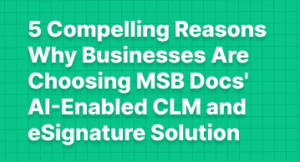Electronic Contracts Vs Traditional Contracts – Let’s bridge the gap!
With the increase in new avenues of digital transformation, the need for paperless processes has become even more significant. Instead of creating, printing, and sending paper documents across, many businesses are switching to its digital counterparts.
What’s the Reason?
Paper-based processes bring major dropdown in the workflow that costs many businesses in terms of money and productivity. One such process that causes a delay in closing deals and turns out to be a hurdle in business growth is Contract Management carried out in a traditional way, i.e. based on paper.
Those who are aware of the limitations in carrying out contract management processes in a traditional way have already switched to the alternative to traditional hard-copy contracts. Those who are not, lie in the group of people who are still skeptical of deciding to go with electronic contracts. So, for those, we are here with some differences between electronic contracts and traditional contracts with the hope to give much clarity on this part. So, let’s discuss them one by one.
Traditional contracts are time consuming whereas Electronic contracts are not
In the business world, negotiation in contracts is a major step that requires countless modifications. The print sign scan routine takes up a lot of time to handle it. Having face to face meetings is another drawback as a lot of unmatched time is consumed by both parties. This is not the case with electronic documents; handling negotiations are much easier when you go digital. Contracting parties can receive, view, and sign the contracts anywhere and anytime.
Electronic contracts involve fewer errors than traditional contracts
Carrying out contractual processes traditionally might leave either party with discrepancies as there are more chances of errors or manipulation. This leads to legal disputes and other situations in which one or both parties have no legal leverage. On the other hand, electronic contracts are completely automated, which means there are fewer chances of typographical errors, and one can easily track the manipulations if any.
Electronic contracts save you on unnecessary operational costs
The implementation of the contractual process involves manual time and efforts along with the material such as paper, printing, etc. That adds to the transactional cost of a contract. This additional cost disappears instantly when you switch to electronic contracts.
APIs allow you to integrate electronic contracts from your CRM
Switching to electronic contracts enables you to integrate the chosen platform with Salesforce, HubSpot, Microsoft CRM, etc. This broadens the functionality and the opportunities that you can generate from existing CRM. Staying with the traditional contracts won’t let you leverage such benefits. We, at MSB Docs, offer Salesforce integration to our clients.
Electronic contracts are legally binding
This is the main reason why there are people who don’t want to switch to electronic contracts. But the good news is that you don’t have to worry about it anymore! Electronic contracts are legally binding documents between two contracting parties within the common law. Contracting parties can sign the documents without compromising their privacy.
Electronic contracts let you easily track, and find data than traditional contracts
Since everything is stored on the cloud, there is no chance of losing data. MSB Docs also offers a smart categorization of documents so that one can track and find data easily. On the other hand, traditional contracts require physical storage, which is not as reliable as its digital alternative.
As you can see from the above differences that there are several advantages in switching to electronic contracts and getting rid of traditional paper contracts, so what are you waiting for? Get ready to save money, improve productivity, and create more secure electronic transactions than ever. Scale-up your business by going digital with us!





